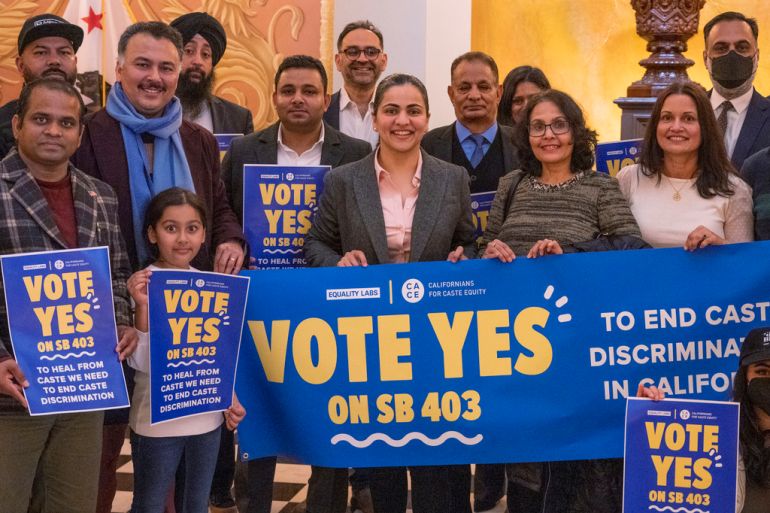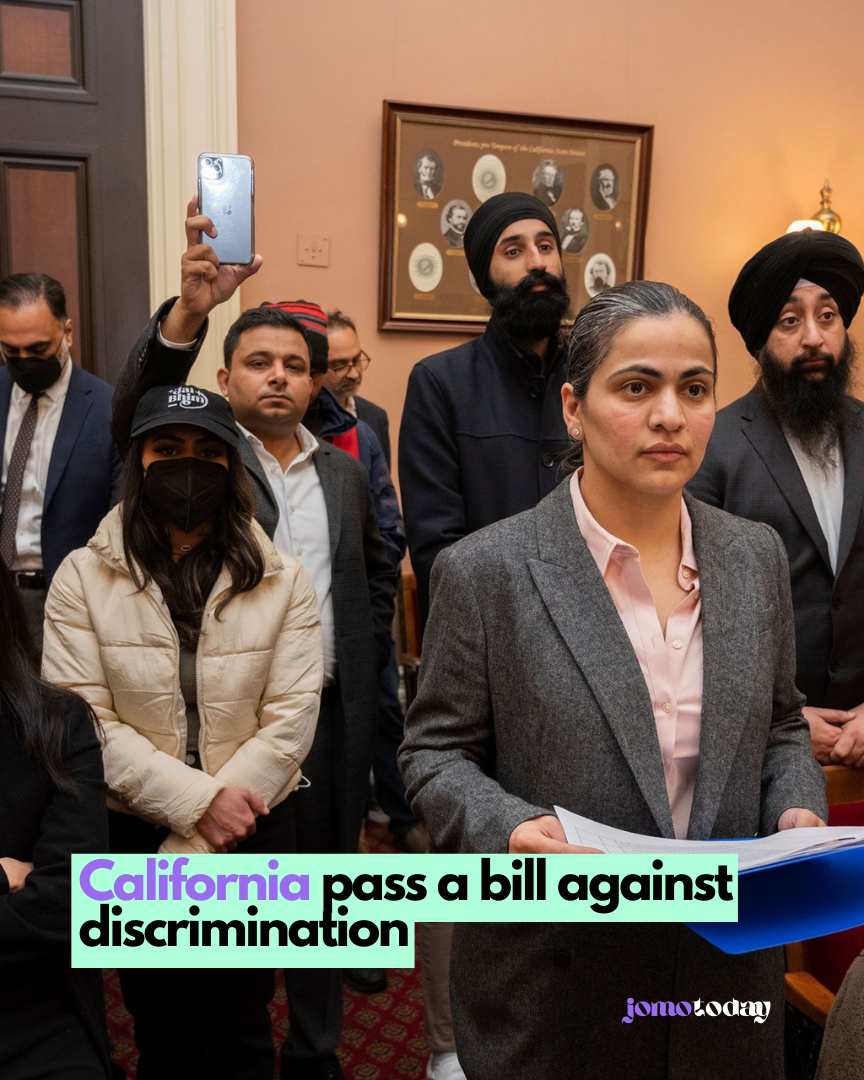In a historic move, the California state legislature has achieved a significant milestone by passing a groundbreaking bill that prohibits discrimination based on caste. This centuries-old system of social hierarchy, originating in South Asia, has been officially included as a protected category under the state’s civil rights law, alongside existing protections in education and housing codes. The bill, known as SB 403, received resounding support in the State Senate, passing with a decisive margin of 31-5. This progressive legislation marks a significant step forward in promoting equality and combating discrimination in the state of California.

The next crucial step for the bill is reaching the desk of Governor Gavin Newsom, and activists are urging the Democratic governor to endorse and enact it into law.
In a news conference held on Wednesday, Democratic State Senator Aisha Wahab, the bill’s author, expressed her pride in standing alongside Californians who have experienced caste discrimination and those who are advocating for its cessation. She emphasized the importance of shedding light on this age-old form of discrimination, one that has persisted for thousands of years and has acted as invisible constraints on the lives of millions of people.
The bill’s journey to becoming law has garnered substantial support from a diverse array of civil rights and social justice organizations, and its passage is being hailed as a significant milestone in the fight against caste-based discrimination in North America.
Before gaining approval in California’s Senate, the bill had already passed through the State Assembly on August 29, receiving overwhelming support with a vote of 55-3, a clear demonstration of its broad backing.
Members of the Dalit community, who occupy the lowest rung of the caste system, have reported the persistence of caste-based discrimination within the South Asian diaspora, with instances occurring in workplaces, educational institutions, and social settings.
The caste system has deep historical roots, notably in countries like India, where it was officially abolished following the nation’s independence in the late 1940s. However, Dalits contend that discrimination and the violent enforcement of social divisions have remained enduring challenges.
In California, some Dalits have shared that they only became aware of their caste identity when they experienced discrimination from individuals belonging to privileged castes. Shahira Kaur, who collaborated with the Dalit rights group Equality Labs to advocate for the bill, revealed that her family never discussed caste with her, and her awareness began to develop when she heard her friend’s mother use a derogatory term, “chamar,” against her during high school. This incident was a painful awakening, leading to some South Asian friends distancing themselves from her, with one even asking her to sit at a separate lunch table due to her caste identity.
While Governor Newsom has not yet commented on the bill, activists are optimistic about its prospects for becoming law, as its resounding approval in both the State Senate and Assembly suggests strong support. “We brought together hundreds of organizations with a singular goal: to enhance accessibility to opportunities for all in our state and to eliminate discrimination within our institutions,” stated Thenmozhi Soundararajan, the director of Equality Labs, during a news conference held on Wednesday.
Soundararajan, along with fellow members of the California Coalition for Caste Equity (CCCE), a collective of organizations that championed the bill, has initiated a hunger strike in solidarity with the bill’s final passage.
She stated, “Until this bill becomes law, we will not eat. And part of it is a sacred commitment to love, to unity, to healing and reconciliation. Because we believe that we are stronger together.”
Although SB 403 encountered relatively minimal resistance in the state legislature, it faced strong opposition from several Hindu American groups, who are now urging Governor Newsom to veto it. The Hindu American Foundation (HAF) expressed their opposition on social media, labeling the bill as divisive and implying that it unfairly targets South Asians.
These groups dispute the severity of caste-based discrimination in North America and argue that the legislation unfairly singles out Hindus. In response, Dalit rights groups firmly reject these claims, portraying them as a backlash against the political mobilization of caste-oppressed individuals.
Senator Wahab, California’s first Afghan-American female legislator and the bill’s author, acknowledged the challenges faced during its passage, including misinformation and prejudiced comments directed at her and the broader movement. She emphasized that the bill is rooted in common sense and aims to address a pressing issue.
Other supporters of the bill reject the notion that it will lead to discrimination against South Asians. Kiran Gill, director of the Sikh American Legal Defense and Education Fund (SALDEF), underlined the brutality of the caste system and its contradiction with principles of equality and human dignity. Gill highlighted that the Sikh community has experienced civil rights abuses and sees the need to support and advocate for this cause.
While the California bill represents a significant step in including caste within the realm of civil rights protections, it follows a series of victories in various cities and municipalities across North America.
In February, the city of Seattle in the United States made the decision to prohibit discrimination based on caste. Subsequently, the school board in Toronto, Canada, took steps in the following month to acknowledge caste-based discrimination and committed to developing a framework to address it.
Anil Wagde, an activist affiliated with Americans Against Caste Discrimination, expressed gratitude to Kshama Sawant, who initiated this effort in Seattle, and Aisha Wahab, who led the charge in California, for their contributions to advancing the cause.
Upon the bill’s passage in the State Assembly just last week, supporters congregated outside the State Capitol building, celebrating with chants that paid tribute to Bhimrao Ramji Ambedkar, a prominent Dalit civil rights leader who authored India’s constitution and vehemently criticized the oppressive nature of the caste system. The crowd chanted “Jai bhim! Jai bhim!”—a slogan widely embraced among Dalits, signifying “Victory to Bhim!”
Read More: Ruby Tui returns to Black Ferns in squad for WXV 1






1 Comment